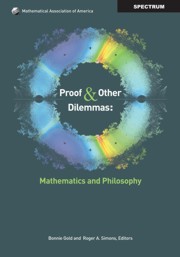Book contents
- Frontmatter
- Contents
- Acknowledgments
- Introduction
- I Proof and How it is Changing
- II Social Constructivist Views of Mathematics
- III The Nature of Mathematical Objects and Mathematical Knowledge
- IV The Nature of Mathematics and its Applications
- 12 Extreme Science: Mathematics as the Science of Relations as Such
- 13 What is Mathematics? A Pedagogical Answer to a Philosophical Question
- 14 What Will Count as Mathematics in 2100?
- 15 Mathematics Applied: The Case of Addition
- 16 Probability—A Philosophical Overview
- Glossary of Common Philosophical Terms
- About the Editors
16 - Probability—A Philosophical Overview
from IV - The Nature of Mathematics and its Applications
- Frontmatter
- Contents
- Acknowledgments
- Introduction
- I Proof and How it is Changing
- II Social Constructivist Views of Mathematics
- III The Nature of Mathematical Objects and Mathematical Knowledge
- IV The Nature of Mathematics and its Applications
- 12 Extreme Science: Mathematics as the Science of Relations as Such
- 13 What is Mathematics? A Pedagogical Answer to a Philosophical Question
- 14 What Will Count as Mathematics in 2100?
- 15 Mathematics Applied: The Case of Addition
- 16 Probability—A Philosophical Overview
- Glossary of Common Philosophical Terms
- About the Editors
Summary
From the Editors
The work in the philosophy of probability seems much closer to the mathematical content than most work by philosophers of mathematics. This could be because probability is a relatively recent addition to the set of mathematical subjects, or maybe because of its origins in topics such as gambling. Perhaps because everyone has studied at least some mathematics in school, but not everyone has studied much probability, there are fewer philosophers working in the philosophy of probability. Alan Hájek is a philosopher with a deep interest in the philosophy of probability. His chapter is an introduction to many of the issues currently being discussed in the philosophy of probability. It should be accessible to anyone who has taken the standard undergraduate probability and statistics course. Neither of the editors of this volume have done any work in the field, but the questions here seem very natural to us.
Alan Hájek is a Professor of Philosophy in the Research School of Social Sciences at the Australian National University (philrsss.anu.edu.au/people-defaults/alanh/index.php3).His research interests include the philosophical foundations of probability and decision theory, epistemology, the philosophy of science, metaphysics, and the philosophy of religion. His paper “What Conditional Probability Could Not Be” won the 2004 American Philosophical Association Article Prize for the best article published in the previous two years by a younger scholar. The Philosopher's Annual selected his “Waging War on Pascal's Wager” as one of the ten best articles in philosophy in 2003. Other articles of interest are “Perplexing Expectations” (with Harris Nover), Mind 115, (2006) and “The Cable Guy Paradox”, Analysis, 65: 2, (2005).
- Type
- Chapter
- Information
- Proof and Other DilemmasMathematics and Philosophy, pp. 323 - 340Publisher: Mathematical Association of AmericaPrint publication year: 2008

